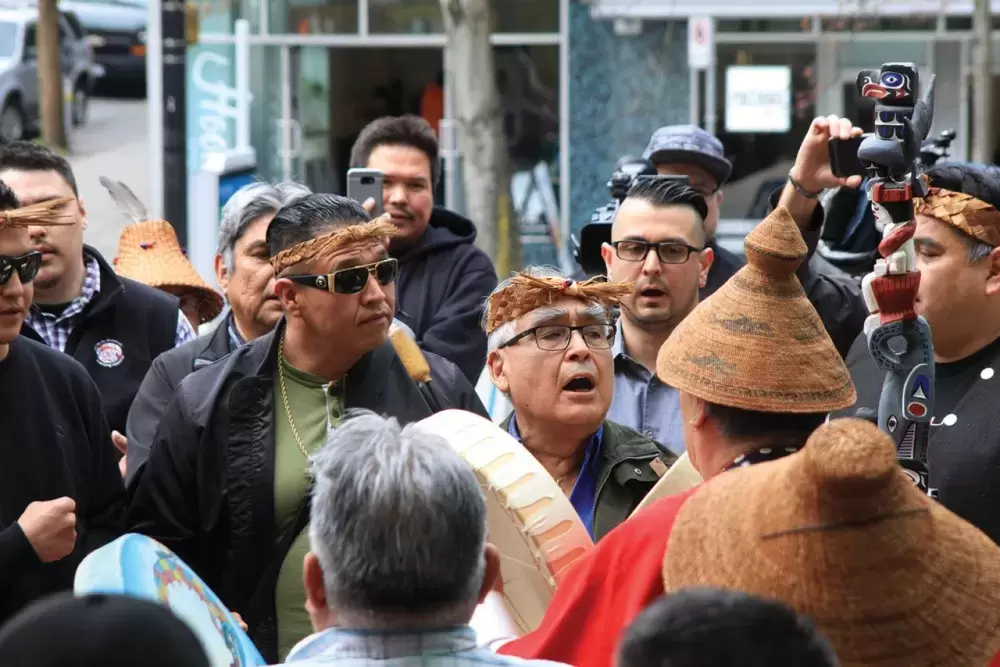The direction of this year’s meagre chinook salmon fishery could change this week if Federal Court grants an injunction on behalf of five First Nations on the west Coast of Vancouver Island.
Citing constitutional rights to their territorial resources, five Nuu-chah-nulth nations filed a court application against a decision this summer by Fisheries and Oceans Canada. Without providing any additional access to the Ahousaht, Ehattesaht/Chinekintaht, Hesquiaht, Tla-o-qui-aht and Mowachaht/Muchalaht First Nations, DFO opted to reallocate part of the total allowable chinook catch from the recreation sector to the regular commercial fishery. This DFO decision increases the Area G commercial catch from 14,000 to 20,000 chinook, with the possibility of another 4,000-5,000 more in September.
Meanwhile the nations’ T’aaq-wiihak fishing boats remain docked with an estimated 477 catches remaining from their allocations. This year the T’aaq-wiihak operation - which translates as fishing with permission of the Ha’wiih (hereditary chiefs) - were allocated 7,000 chinook, said the fisheries’ manager Alex Gagne. The DFO granted sports fishers on the west coast of Vancouver Island a notional allocation of 50,000 chinook, but recreational catches have so far not come close to this amount.
Gagne said the application for an injunction came after multiple attempts this summer to engage with the federal department.
“We have met with DFO numerous times to discuss this matter, and have sent them seven letters articulating our perspectives in order to seek resolution,” she said. “DFO has not responded to or even acknowledged any of our letters, or come up to the table to try and find a workable solution.”
The injunction application is being heard in Federal Court today and Wednesday, and Gagne expects a decision as early as Wednesday afternoon or Thursday morning. If the injunction is granted, this would give T’aaq-wiihak boats time to mobilize while the chinook salmon, or suuhaa, are still in their waters.
“If it is favourable, the fishery would reopen, we proposed, Saturday,” said Gagne. “That would give fishers approximately 48 hours to gear up their boats, get going and then go out. There is a time-sensitive nature here; the fish are in the area now, so it’s not something we want to wait on.”
T’aaq-wiihak stresses that DFO’s refusal to grant any more suuhaa allocations goes against a 2009 decision from the Supreme Court of Canada, which found that the five nations have the Aboriginal right to harvest and sell fish from their respective territorial waters. The court also determined that DFO policies had infringed this Aboriginal right.
After years of stalled negotiations between the nations and DFO, the matter returned to court with the Justification Proceeding s in 2015 and 2016. This resulted in a B.C. Supreme Court decision in April 2018 stating that Canada had not justified the DFO’s infringement of the nations’ Aboriginal right.
“[A] generous approach is required for allocations of AABM chinook, given the importance of that species to the plaintiffs, the lack of evidence of effects on the rest of the commercial fishery if the mitigation policy is not adhered to for this species, and the priority the plaintiffs have over the recreational fishery,” wrote Justice Humphries in her ruling.
Chinook fisheries across the West Coast have faced stringent restrictions this year, since DFO measures to protect endangered stocks originating from the Fraser River were announced in April. Some commercial fisheries have not opened until August, while offshore sports fishing boats west of Vancouver Island were not permitted to retain any chinook until July 15. Similar restrictions also applied to chinook fishing for First Nations’ food, social and ceremonial purposes.
During a Council of Ha’wiih Forum on Fisheries in June, seasoned Ahousaht fisherman Harold Little expressed the frustration felt by many in his community. He told DFO officials at the forum that this is the first time he’s seen sports fishing boats inside the surf line at that time of the year.
“Our hahoulthee is as far as you can see in the ocean. We own it,” he said. “I want to know how you own it. What right do you have to tell us what to do?”







